We travel, initially, to lose ourselves; and we travel, next to find ourselves. We travel to open our hearts and eyes and learn more about the world than our newspapers will accommodate. We travel to bring what little we can, in our ignorance and knowledge, to those parts of the globe whose riches are differently dispersed. And we travel, in essence, to become young fools again – to slow time down and get taken in, and fall in love once more. - Pico Iyer
8 June 2019, wild camp to Cabo Ledo, 76,4km
Hospedaria Ni 8,000Kz (R357)
We slept long and hard despite our anxiety. In the silence of the night, when awake, we could hear the sea, though it had not been visible to us during our ride from Porto Amboim. While packing up this morning, two men came by, greeting us without stress.
Not long after leaving our campsite, we reached and crossed a river whose wide bed was overgrown with fresh-green papyrus, an extraordinarily pretty plant. Across the river, at the entrance to Parque Nacional da Quicama, was a lively market at which we bought giblets and chips for breakfast, and chatted briefly to two English-speaking men from Luanda, one of which lived in Cape Town (Bellville) for 12 years, coming home to Angola at his mom’s request when his dad died. As the oldest son, it is his duty and role to protect and support his younger siblings. At the bridge, we saw a water truck slurping water from the river, and later saw similar trucks and others delivering water to rural homesteads, dropping off containers, or filling barrels on the roadside.
Homesteaders often place something for sale on the roadside, leaving it unattended, relying on the honesty of passing motorists to call for attention when needed. Outside a poor home today, we saw just one bucket of pulp extracted from the fruit of a baobab. One bucket containing perhaps the family’s only income for the day, or week, a statement both forlorn and brave. Outside another home, obviously wealthier, many watermelons. As we pulled up looking to make a purchase, a young man appeared at the head of the path near his home about 100m off the road, vigilant, obviously, and immediately aware of our presence. We bought and sliced open and ate a watermelon standing there in the sun, telling the young man and both parents who came out to join him, in stilted Portuguese, where we had come from and where we were headed.
Not long after reboarding the bikes, we came across a recent accident, the truck driver sitting bloody head in hands in the overturned cab of his vehicle. Although it is likely he was concussed, he was not bleeding heavily enough to be in immediate danger. In response to my limited queries, he gestured that he had called someone, and that he had water, so we left him there and went on our way, hoping the man who had walked over from a nearby hut and was looking at the goods he carried would leave them be.
A restaurant owner at the entrance to town arranged for an autocycle taxi to lead us to a pensão, but the water truck had not delivered to them today, so they refused to accommodate us. Luckily we had spotted Hospedaria Ni on our ride through town and back we went to be given a room facing onto a large courtyard where a dog was chained to one tree and a monkey to another; the owner’s wife was wearing a Princess Di T-shirt. There seemed to be some … er … confusion about the price; it started at 5,350Kz, ended at 8,000Kz.
We bathed and cycled back to Restaurante 120 na Braza, where we were served an outstanding meal: two different fish, both delicious, potatoes, boiled eggs and stir fried veg. While waiting for our food, we met and chatted to two Portuguese men, both working for Unitel in Luanda for 12 years, both keen surfers, hence their presence in Cabo Ledo. Charl showed them his leg tan where a distinct line separates his white thighs from his near-black knees and lower legs. “You are half white and half black”, they exclaimed, getting out their mobiles to take photos. Interestingly, many black Angolans are clearly confused when Charl pulls this party trick, not knowing the sun’s impact on white skin.
When we returned to the hospedaria after dinner, the police were there to collect our passport information.
For today's route see below photos
For overview route, click on ROUTE tab above…
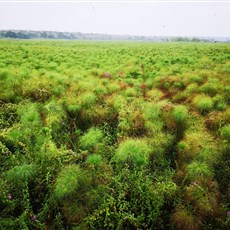
Wild camp to Cabo Ledo
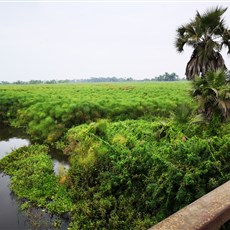
Wild camp to Cabo Ledo
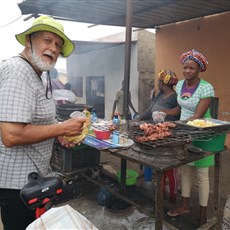
Wild camp to Cabo Ledo
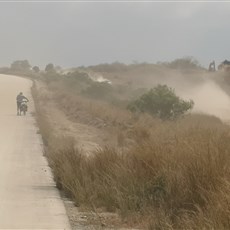
Wild camp to Cabo Ledo
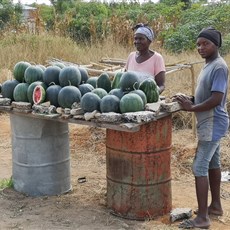
Wild camp to Cabo Ledo
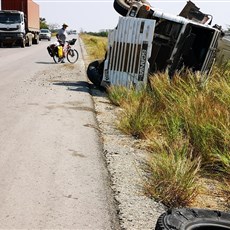
Accident scene
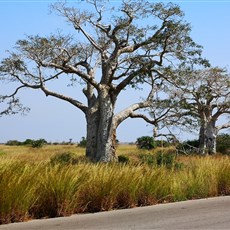
Wild camp to Cabo Ledo
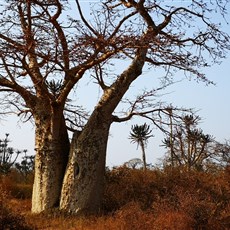
Wild camp to Cabo Ledo
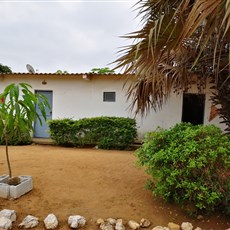
Hospedaria Ni, Cabo Ledo
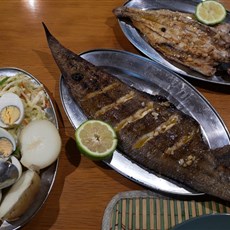
Restaurante 120 na Braza, Cabo Ledo